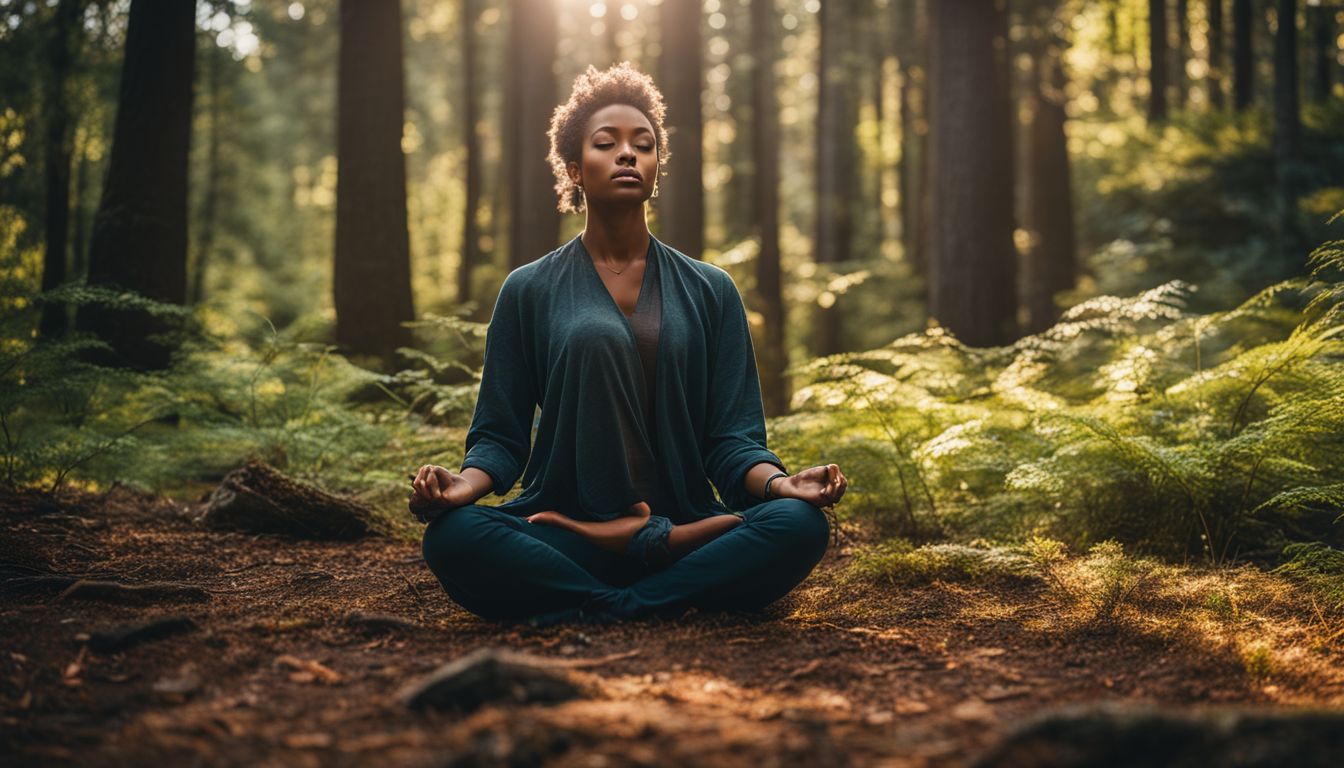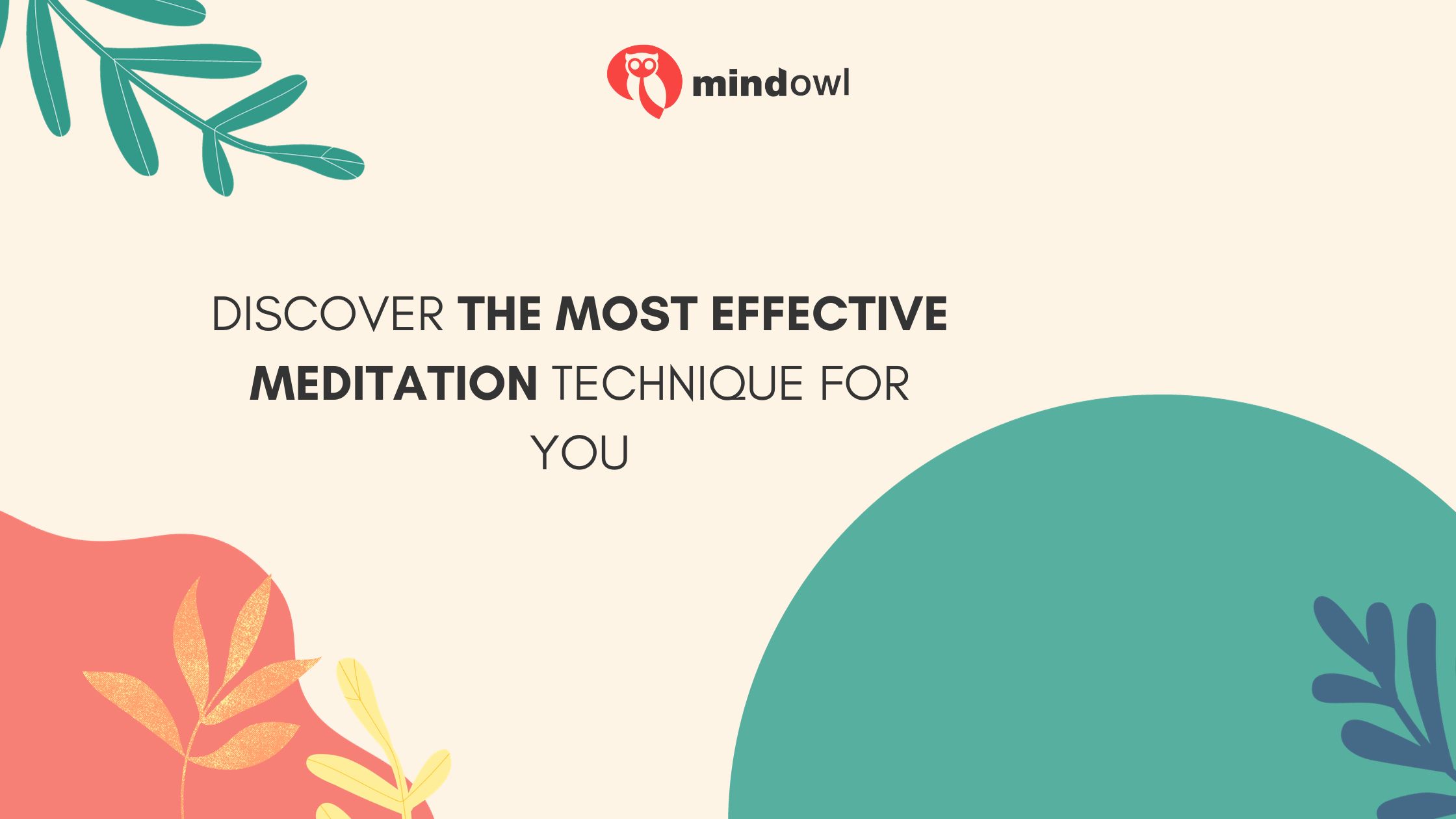
In today’s fast-paced world, finding peace of mind can feel like searching for a needle in a haystack. You might have already dabbled in meditation but still find yourself asking, “Am I doing this right?” or even, “Which type of meditation will truly help me relax and de-stress?” With the mountain of information out there, pinpointing the most effective technique to calm your buzzing thoughts can turn into an overwhelming quest.
One fact that stands out is that mindfulness meditation isn’t just about sitting quietly; it actually adapts to your environment, giving you the flexibility to practise it anywhere—whether on a busy train or during a lunch break at work.
In this blog post, we’ll take you through different practices acclaimed for their effectiveness and guide you through selecting one that resonates with your lifestyle and goals. Prepare to discover how daily doses of specific meditations could usher in tranquillity into your life.
Ready? Let’s embark on this path towards serene well-being!
Key Takeaways
- Meditation helps calm your mind and has good effects on your wellbeing.
- There are many types of meditation like mindfulness, spiritual, and movement. Each one suits different people.
- To find the best meditation for you, try lots of kinds to see which feels right. Think about what you need from meditating and how it fits your life.
- Your favourite meditation technique will be the one that matches what you want and enjoy doing.
- You can meditate anywhere, anytime; it’s flexible to fit into your daily routine.
Understanding Meditation and its Benefits

Meditation is a practice that involves training the mind to focus and redirect thoughts. It has been shown to have numerous mental, emotional, and physical benefits, including reducing stress, improving concentration, and promoting overall well-being.
Definition of meditation
Meditation is all about setting your mind free. You use special techniques to quiet your thoughts and feel more relaxed. People meditate to help their brain and body become calm and focused.
It’s like training to help you notice what’s going on in the present moment, without letting your thoughts or feelings take over.
You can think of meditation as a way for your mind to hit the gym. Just as exercise makes your body stronger, meditation develops the power of your mind. This practice can lead you to discover deep peace within yourself and a sense of connection with everything around you.
Mental, emotional and physical benefits of meditation
Meditation brings a sense of calm and peace that helps with emotional well-being. People often feel more balanced after they meditate. This balance can improve how we feel throughout the day.
It also has long-term benefits for our overall health.
Focusing on your breath during meditation may increase your memory, mental clarity, and focus. These are great ways to fight cognitive decline as you get older. Reducing stress through regular practice can make you more creative too.
Now let’s explore different types of meditation techniques to see which one might be best for you.
Types of Meditation Techniques

Meditation techniques vary widely, including mindfulness meditation, spiritual meditation, focused meditation, movement meditation, and mantra meditation. Each technique offers unique benefits and approaches to quieting the mind and achieving a meditative state.
Mindfulness meditation
Mindfulness meditation is a powerful form of meditation with roots in Buddhist traditions. It helps you focus on the present, paying attention to thoughts, feelings, and sensations without judgment.
As you sit quietly, you observe your breath or how different parts of your body feel. This practice encourages calmness by teaching us to experience each moment as it happens.
Studies show that regular mindfulness sessions are great for both mental and physical health. People who meditate this way often find they have less stress and their anxiety levels drop.
Health benefits like lower blood pressure and fewer signs of depression have been linked to this type of meditation. With its growing popularity in the West, many find it an effective daily practice for staying balanced and centered.
Spiritual meditation
Spiritual meditation helps you find a deeper connection with your inner self and the world around you. You might focus on sacred texts, spend time in prayer or reflect on the universe’s vastness to feel closer to a higher power.
This practice can be calming and give insight into your life’s purpose.
People who enjoy silence and seek spiritual growth often choose this type of meditation. It lets them explore their beliefs and find peace in knowing there is something greater than themselves.
After learning about spiritual meditation, we will look at focused meditation next.
Focused meditation
Focused meditation helps you pay attention to the now. You keep your mind on one thing, like how your breath goes in and out, a sound you hear, or a picture in your head. It’s also called concentration meditation because it makes your mind quieter and sharper.
If you choose this practice, starting with focusing on your breath is a great option.
Find a calm place to sit or lie down when doing focused meditation. This will help make sure nothing disturbs you while training your mind to center on the chosen sensation. The goal here is not just peace but also deeper awareness.
– Movement meditation
Movement meditation
Movement meditation suits those who love to stay active. It’s perfect if sitting still doesn’t feel right for you. In this type of meditation, your body keeps going while your mind slows down.
You might do yoga or tai chi, where movements are slow and steady. Or you could go for a walk in the park, paying close attention to each step and the feeling of your feet touching the ground.
This practice is all about being in tune with how your body moves. Whether it’s through gentle stretches or more lively exercise, movement meditation connects you with the present moment.
You learn to notice every motion and breath, which can bring peace just as much as sitting quietly does. It’s great because it gives you a chance to quiet the mind while also giving your body some love!
Mantra meditation
Mantra meditation calms your mind with special words or sounds. You repeat a mantra many times to help you focus and get rid of stress. This type of meditation is easy for beginners but also good for people who have meditated for a long time.
It is part of Hindu and Buddhist ways, where the sound clears your thoughts.
Repeating mantras makes you concentrate and sets an intention in your mind. Many people find this way very powerful for being less stressed and healthier overall. Mantra meditation makes it simple to stay present and can be done anywhere, anytime.
Finding the Most Effective Meditation Technique
When it comes to finding the most effective meditation technique, it’s important to try different options and consider factors such as individual preferences and lifestyle. The key is to find a technique that works best for you and fits seamlessly into your daily routine.
The importance of trying different techniques
To find the most effective meditation technique, it’s important to try different methods because each person responds differently to various techniques. Research has shown that different types of meditation have different benefits, so trying various techniques can help individuals discover what works best for their specific goals and preferences.
With hundreds of meditation practices available, exploring different methods can lead to finding the most effective one for sharpening focus, connecting with the body and breath, or cultivating acceptance of difficult emotions.
Factors to consider when choosing a technique
When choosing a meditation technique, consider the specific benefits you seek. Some techniques may focus on stress reduction, while others may aim for spiritual growth or mental clarity. Factors to consider include:
- Your goals for meditating, such as reducing stress, improving focus, or increasing self – awareness.
- Your comfort level with different meditation styles, such as mindfulness, spiritual, or movement – based techniques.
- The amount of time you can dedicate to practising meditation each day and what fits into your lifestyle.
- Whether you prefer guided meditation practices or self – guided sessions.
- Any physical limitations or discomfort that may affect your ability to maintain certain postures during meditation.
- The presence of any mental health conditions and the suitability of specific meditation techniques for managing those conditions.
- How easy it is for you to stay focused during meditation and whether visualisation techniques might be beneficial for maintaining concentration.
The role of individual preferences and lifestyle
When it comes to finding the most effective meditation technique, individual preferences and lifestyle play a crucial role. Different types of meditation cater to various personal inclinations and daily routines.
Whether someone prefers sitting or moving meditation, silent or guided practice, there are options that accommodate diverse lifestyles.
Meditation can be practiced in different positions or activities, allowing individuals to find a technique that fits their unique preferences and schedules. The role of individual choices and lifestyle is significant when determining the most suitable meditation practice for each person.
Conclusion: The Most Effective Meditation Technique is the One That Works for You
After exploring various meditation techniques, it’s clear that the most effective one is the one that resonates with you. Different methods work for different people, so it’s important to explore and find what suits you best.
Whether it’s mindfulness meditation, loving-kindness meditation, or any other technique, the key is finding what aligns with your preferences and needs. Don’t be afraid to experiment and discover which technique brings you the most benefits – because ultimately, the most effective meditation technique is the one that works for you.
FAQs
1. What is the best type of meditation for beginners?
If you’re new to meditation, mindfulness-based techniques which focus on your breath and being present in the moment are a good start.
2. Can doing daily meditation reduce stress?
Yes, just minutes of meditation every day can help reduce stress and tension in the body.
3. Which type of meditation involves focusing on love and kindness?
Loving-kindness meditation is a practice where you send good thoughts to yourself and specific people.
4. Is there a powerful technique that helps understand true reality?
Vipassana or insight meditation is known for helping meditators see the true nature of reality through awareness on the present.
5. Could I learn transcendental meditation from an app?
A mediation app may help you learn basics but transcendental meditation usually needs guidance from certified teachers.
6. Does all effective mediation involve sitting with eyes closed?
Not always; some practices like body scan let you focus attention on bodily sensations even while moving.
MindOwl Founder – My own struggles in life have led me to this path of understanding the human condition. I graduated with a bachelor’s degree in philosophy before completing a master’s degree in psychology at Regent’s University London. I then completed a postgraduate diploma in philosophical counselling before being trained in ACT (Acceptance and commitment therapy).
I’ve spent the last eight years studying the encounter of meditative practices with modern psychology.

